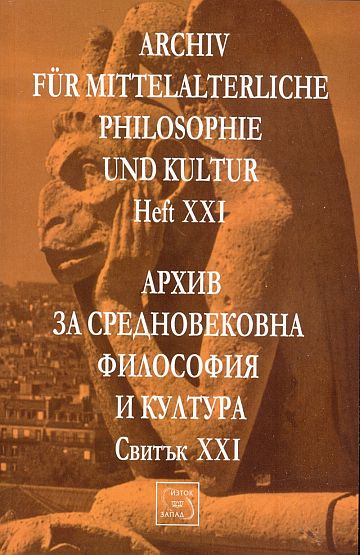Отново за Абу Хамид ал-Газали (поч. 1111), класификацията на науките и мюсюлманското религиозно образование
Al-Ghazali (d. 1111) Revisited: Classification of Sciences and Muslim Religious Education
Author(s): Atanas ShinikovSubject(s): Cultural history, Religion and science , Philosophy of Middle Ages, Middle-East Philosophy, Philosophy of Science, Cultural Anthropology / Ethnology, 6th to 12th Centuries, History of Islam
Published by: Издателство »Изток-Запад«
Keywords: al-Ghazali; Muslim education; classification of sciences; fiqh; kalam; falsafa
Summary/Abstract: Predilections for classification of sciences in Muslim civilization tend to be seen as rooted in the classical antiquity heritage, as Franz Rosenthal goes. Yet the Sunni mainstream produced classifications significantly differing from the Greek antiquity ones, such as the one of Abu Hamid al-Ghazali (d. 1111) in his influential ―Revival of Religious Sciences‖ (Ihyā’ ‘ulūm al-dīn). Proceeding out of a Muslim concept of knowledge (‘ilm), as differing from the Greek ἐπιστήμη, each of the ―branches of knowledge‖ (‘ulūm) acquires value according to its ability to lead Muslims to the rewards of the afterlife (ākhira). The primary division outlines two large categories: duties incumbent upon individual Muslims (farḍ ‘ayn), and ―collective duties‖ (farḍ kifāya) upon the Muslim community. Al-Ghazali does not build a comprehensive framework of sciences, as some indicative and value charged disproportions are observed: sciences like mathematics and medicine find little place. ―Speculative theology‖ (kalām) and philosophy (falsafa) are subordinate, with philosophy not given a status of a separate ―science‖. Among the highest of sciences formally stands the ―science of the unveiling‖ (mukāshafa) and the esoteric (bāṭin), described in terms reminding of the Sufi tradition. Yet what emerges as immediate importance for this world (dunyā), as means for preparation for the afterlife, is Muslim law (fiqh) which has for its subject the external (ẓāhir) dimensions of the life of the umma that can be observed and regulated. Thus we cannot say that the purpose of this classification is the provision of the educational field with a ready-made curriculum. Yet, on the basis of the text of the Ihyā’ we can infer that it provided a framework for a Sunni value positioning of the subjects that could outline the focus areas within the Sunni educational institutions of the Abbasid 11th century, with fiqh occupying a pivotal role.
Journal: Архив за средновековна философия и култура
- Issue Year: 2015
- Issue No: 21
- Page Range: 171-206
- Page Count: 36
- Language: Bulgarian, Arabic
- Content File-PDF

